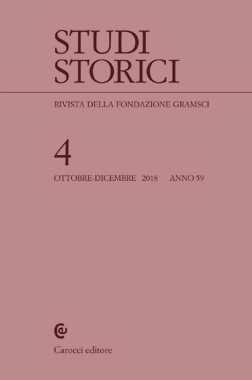
gennaio - marzo 2013 anno 54
Sommario e abstract degli articoli
Francesco Storti, pp. 5-39
La «novellaja» mercenaria. Vita militare, esercito e Stato nella corrispondenza di commissari, principi e soldati del secolo XV
The mercenary «novellaja». Military life, army, and state in the correspondence between officials, princes and soldiers in the fifteenth century
Towards the middle of the fifteenth century, the first permanent mercenary armies were tried out in Italy, and especially in Naples and Milan. These increasingly sophisticated forms of organization of the armed forces were subjected to growing control by the state apparatus. The result of this particular process was a strong tension between lords and their mercenaries that was mainly evident in times of war. The essay aims to explore the features of this tension by considering both the defence of the soldiers’ prerogatives and the authorities’ need to streamline their armies. The «living voice» of the key figures (lords, mercenaries, officials, ambassadors) is analyzed here as it is reflected in rich diplomatic documents recovered through painstaking investigation. The background is the War of Succession (1459-1465) that broke out in the Kingdom of Naples after the death of Alfonso the Magnanimous, a conflict that provides an effective analysis model, due to its characteristics and its duration. What emerges is a vivid picture, in which direct testimony is used to reconstruct the material and psychological universe of mercenary troops in a crucial moment in their professional development.
Roberto Finzi, pp. 41-50
L’«evil of usury» senza ebrei. Una lettura di Petty, Cantillon, Turgot e Smith
The «evil of usury» without Jews. An interpretation of Petty, Cantillon, Turgot and Smith
The essay investigates the presence, or absence, of anti-Jewish stereotypes in the works of William Petty, Richard Cantillon, Anne Robert Jacques Turgot, and Adam Smith. The result of this initial survey is that as early as the late seventeenth century, anti-Jewish prejudice is almost absent for the authors, who place it in a perspective of concrete, real investigation of economic phenomena. So, in Adam Smith’s Wealth of Nations, the «evil of usury» is «evil in itself», without the slightest allusion to Jews or their presumed nature. And for his part, Turgot states: «La loi divine n’a certainement pas pu permettre expressément aux juifs de pratiquer avec les étrangers ce qui aurait été défendu par le droit naturel. Dieu ne peut autoriser l’injustice». Why this road is lost afterwards in a part of the economic culture is another problem.
Paolo Zanini, pp. 51-77
Italia e Santa Sede di fronte al piano Peel di spartizione della Palestina: il tramonto della «carta cattolica»
Italy, the Vatican, and the Peel Partition of Palestine: the decline of the «Catholic Charter»
In July 1937, the British government, unable to stop the Arab national revolt, played the card of Palestinian partition, a suggestion put forward by the Peel Commission of Inquiry. It proposed the division of the region into three different areas: an Arab State, a Jewish State and a zone under British rule. For the first time, the idea of Palestinian partition officially entered the political debate. This article analyzes the reactions of both the Italian government and of the Vatican Secretariat of State to such a proposal. From the Holy See’s point of view, there were two priorities: safeguarding the Catholic communities and the Holy Places; and appearing independent of all nationalistic claims and of those of the Italian government in particular. For this reason, the Holy See rejected the Italian idea for a common action to defend Catholic institutions, showing instead the desire to reinforce its collaboration with the British administration. It is interesting to analyze the Vatican’s attitude towards the Peel Plan, not only as regards the Palestinian setting, but also in order to understand the changes in European relationships
Il presente come Storia
Costantino Paonessa, pp. 79-103
Rivoluzioni arabe. Elementi per il superamento di una lettura orientalistica
Arab revolutions. Elements for overcoming an Orientalist interpretation
Two years have passed since the sacrifice of young Mohamed Bouazizi in Tunisia.
The revolutionary process that has totally changed the Arab world is still ongoing in different ways in the countries concerned. In the following essay, I will analyze this process and focus on the main characteristics that have defined these revolutionary events from the outset. Starting with a careful consideration of a new methodology for analyzing contemporary history (the history of present time), this essay draws a conceptual analysis of the Orientalist myth of the apathy of the Arab (and Islamic) people and their ineptitude in achieving freedom.
Stefano Twardzik, pp. 105-147
Sulle lettere originali di Aldo Moro pervenute nei giorni del suo sequestro
On Aldo Moro’s original letters received during the days of his abduction
The purpose of this essay is to systematize the information acquired to date on the determination and exact number of the letters written by Christian-Democrat leader Aldo Moro while a prisoner of the Red Brigades, and delivered by that terrorist group over the 55 days of his abduction (16 March-9 May 1978). The edition of Aldo Moro’s Letters from the prison, edited by Miguel Gotor (Einaudi, 2008) is a constant source of reference for the first part of this essay, which debates Gotor’s reckoning of the letters and messages actually received during Moro’s detention. The uncertainty about this question stems from the fact that the appointed judicial authorities were not informed of all the letters issuing from the Red Brigades’ prison. The second part deals with some new information concerning the timing of the delivery of some letters, and the upsetting discovery that a few writings by the politician, that have yet to be tracked down, must have arrived before March 29th 1978, the first known delivery date.
Giorgio Volpe, pp. 149-189
Le origini meridionali del sindacalismo rivoluzionario in Italia
The origins of revolutionary syndicalism in Italy
Syndicalism was an important chapter of Italian history in the early 1900s. Although Italian Syndicalism was linked with the equivalent movement in France (Georges Sorel), it had several distinctive features and developed through different stages. With the support of previously unknown documents, this study investigates the movement’s political and cultural origins. In particular, it analyzes the relevance of the Southern Italian setting, from which most of the syndicalists came. The article, then, in addition to reconstructing their early political experiences, focuses on the syndacalists’ political and economical thought and on their personal relationships (Antonio Labriola, Benedetto Croce, etc.).
Matteo Stefanori, pp. 191-226
«Ordinaria amministrazione». I campi di concentramento provinciali per ebrei nella Rsi
«Ordinary administration»: concentration camps for Jews in the Italian Social Republicy
This article examines the concentration camps for Jews opened up by decree no. 5 of 30 November 1943 issued by the Italian Social Republic’s Interior minister, Guido Buffarini Guidi. Under this measure, the republican government entrusted the peripheral authorities of the Ministry of the Interior, prefectures and police headquarters with the task of arresting and interning all the Jews present in Italy. The implementation of the orders was influenced by the war background of the years 1943-1945, and specifically by the German occupation of Italy, which followed the armistice of 8 September 1943. Although the German authorities kept the RSI under tight control, the local authorities of Salò seemed to maintain a certain degree of autonomy and initiative in enforcing the anti-Jewish measures decided upon by the government. Concentration camps played a key role in that setting. Focusing on these camps, this article examines the «Jewish question» in the RSI, with a view to gaining a deeper understanding of the features of state anti-Semitism in Salò, which represented an extension of anti-Semitism during the fascist regime, as well as of the political dynamics that characterized the collaboration between Italian and German authorities.
Sfoglia gli altri numeri dell’anno 54 / 2013
Elenco dei fascicoli pubblicati dal 2010
Seleziona fascicolo...
- anno 65 / 2024
- 1
- 2
- anno 64 / 2023
- 1
- 2
- 3
- 4
- anno 63 / 2022
- 1
- 2
- 3
- 4
- anno 62 / 2021
- 1
- 2
- 3
- 4
- anno 61 / 2020
- 1
- 2
- 3
- 4
- anno 60 / 2019
- 1
- 2
- 3
- 4
- anno 59 / 2018
- 1
- 2
- 3
- 4
- anno 58 / 2017
- 1
- 2
- 3
- 4
- anno 57 / 2016
- 1
- 2
- 3
- 4
- anno 56 / 2015
- 1
- 2
- 3
- 4
- anno 55 / 2014
- 1
- 2
- 3
- 4
- anno 54 / 2013
- 1
- 2
- 3
- 4
- anno 53 / 2012
- 1
- 2
- 3
- 4
- anno 52 / 2011
- 1
- 2
- 3
- 4
- anno 51 / 2010
- 1
- 2
- 3
- 4
